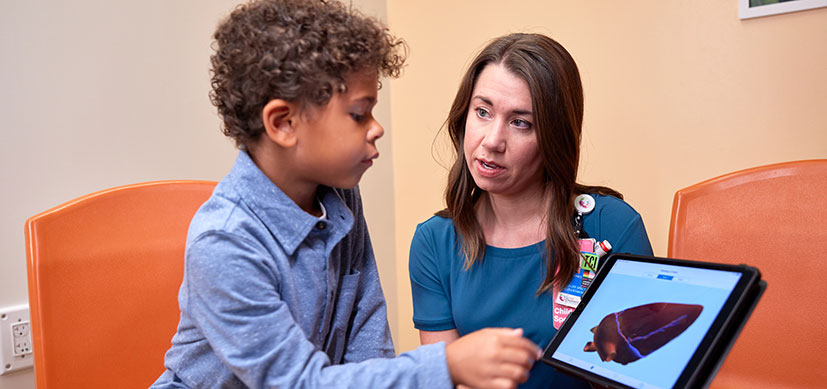
Nadine A. Kasparian, PhD, PMH-C, MAPS
- Director, Heart and Mind Wellbeing Center
- Member, Division of Behavioral Medicine and Clinical Psychology
- Professor, UC Department of Pediatrics
About
Biography
I am a professor of Pediatrics and director of the Heart and Mind Wellbeing Center and the Center for Heart Disease and Mental Health Research.
My research investigates the factors that shape emotional and neurobiological development in children with critical or chronic illness, particularly congenital heart disease (CHD). My team seeks to understand how experiences of early medical adversity may alter developmental processes, including emotion regulation and stress reactivity, in ways that increase vulnerability to anxiety, depression and other mental health difficulties. My team also explores infant-parent bonding and attachment, and the ways in which we can best support young children and their families in the context of medical illness. In partnership with patients, parents and health care providers, the overarching goal is to discover the mechanisms that contribute to developmental risk and resilience, and deliver targeted interventions, strategies and policies to promote health and wellbeing throughout childhood and across the life course. My team pursues this research using methods drawn from clinical and developmental psychology, neurobiology and medical science.
I have a PhD in medical psychology from the University of Sydney and serve on the editorial board for Health Psychology Review and Psychology & Health. I hold a National Heart Foundation of Australia Future Leader Fellowship (2017-2020), have been continuously funded by the National Health & Medical Research Council (NHMRC) of Australia, and was awarded a Harkness Fellowship in Health Care Policy and Practice based at Harvard Medical School (2018-2019). In 2018 my team received the Sydney Children's Hospitals Network Innovation Award for Excellence in the Provision of Mental Health Services for children with heart disease and their families.
BA: Psychology (Honors Class I), University of Sydney, Sydney, Australia,
PhD: Medical Psychology, University of Sydney, Sydney, Australia,
Graduate Diploma: Perinatal and Infant Mental Health, NSW Institute of Psychiatry, Australia,
Interests
, childhood heart disease; congenital heart disease; mental health; wellbeing; infant mental health; child mental health; perinatal mental health; parent mental health; bonding; attachment; neurodevelopment; neurobehavior; emotion regulation; prenatal anxiety; prenatal depression; postnatal anxiety; postnatal depression; parenting; family functioning; anxiety; depression; trauma; traumatic stress; adverse childhood experiences; empathy; resilience; adaptation; psychotherapy; psychological intervention; trauma-informed care; psychologically-informed care; integrated care; mental health care
Interests
; mental health; neurodevelopment; neurobiological responses to stress; heart-brain-gut axis; brain imaging; hypothalamus-pituitary-adrenal (HPA) axis; microbiome; biomarkers; biobank; stress reactivity; pregnancy; child development; intervention; randomized controlled trials; prospective cohort studies; qualitative research; acceptability and feasibility studies; psychotherapy; clinical research; translational research; health services; health policy
Research Areas
Publications
Mother-Infant Dyadic Synchrony and Interaction Patterns After Infant Cardiac Surgery. Journal of Pediatric Psychology. 2024; 49(1):13-26.
Neuroimaging and Neurodevelopmental Outcomes Among Individuals With Complex Congenital Heart Disease: JACC State-of-the-Art Review. Journal of the American College of Cardiology. 2023; 82(23):2225-2245.
If Not Now, When? Taking Action to Improve Mental Health Outcomes for Families of Children With Heart Disease. Pediatric Critical Care Medicine. 2023; 24(11):966-969.
Mental Health Conditions Among Children and Adolescents With Congenital Heart Disease: A Danish Population-Based Cohort Study. Circulation. 2023; 148(18):1381-1394.
Addressing Adverse Childhood and Adult Experiences During Prenatal Care. Obstetrics and Gynecology. 2023; 141(6):1072-1087.
Biological and structural phenotypes associated with neurodevelopmental outcomes in congenital heart disease. Translational Pediatrics. 2023; 12(4):768-786.
Parent-child bonding and attachment during pregnancy and early childhood following congenital heart disease diagnosis. Health Psychology Review. 2022; 16(3):378-411.
Psychological Outcomes and Interventions for Individuals With Congenital Heart Disease: A Scientific Statement From the American Heart Association. Circulation: Cardiovascular Quality and Outcomes. 2022; 15(8):e000110.
Quality of Life and Other Patient-Reported Outcomes Across the Life Span Among People With Fontan Palliation. Canadian Journal of Cardiology. 2022; 38(7):963-976.
Tell me once, tell me soon: parents' preferences for clinical genetics services for congenital heart disease. Genetics in Medicine. 2018; 20(11):1387-1395.
From the Blog
Mental Health Care Critical to Perinatal Cardiovascular Health
Nadine A. Kasparian, PhD, PMH-C, MAPS2/25/2025
How Neuroimaging Illuminates Links Between CHD and Mental Health
Nadine A. Kasparian, PhD, PMH-C, MAPS2/12/2024
Cincinnati Children’s Opens Nation’s First Heart and Mind Wellbeing Center
Nadine A. Kasparian, PhD, PMH-C, MAPS1/24/2023
Mental Health Care Vital to Congenital Heart Disease Care
Nadine A. Kasparian, PhD, PMH-C, MAPS7/18/2022








